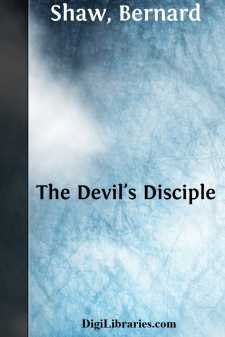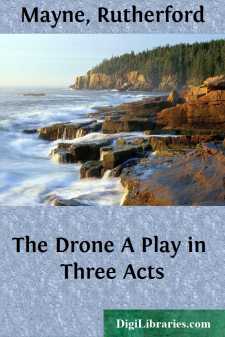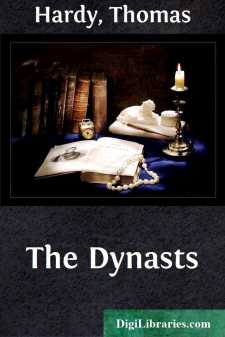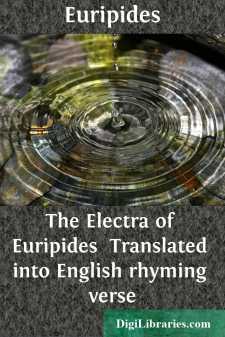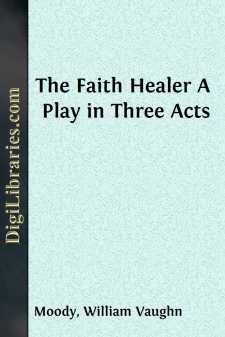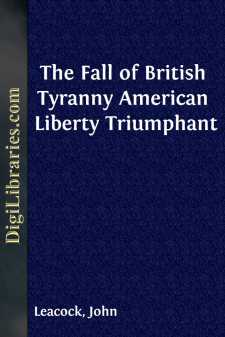Drama Books
Sort by:
by:
Bernard Shaw
ACT I At the most wretched hour between a black night and a wintry morning in the year 1777, Mrs. Dudgeon, of New Hampshire, is sitting up in the kitchen and general dwelling room of her farm house on the outskirts of the town of Websterbridge. She is not a prepossessing woman. No woman looks her best after sitting up all night; and Mrs. Dudgeon's face, even at its best, is grimly trenched by the...
more...
by:
William Congreve
TO THERIGHT HONOURABLE CHARLES MONTAGUE,ONE OF THE LORDS OF THE TREASURY. Sir,—I heartily wish this play were as perfect as I intended it, that it might be more worthy your acceptance, and that my dedication of it to you might be more becoming that honour and esteem which I, with everybody who is so fortunate as to know you, have for you. It had your countenance when yet unknown; and now it is made...
more...
THE STAGE AS IT IS. LADIES AND GENTLEMEN, You will not be surprised that, on this interesting occasion, I have selected as the subject of the few remarks I propose to offer you, "The Stage as it is." The stage—because to my profession I owe it that I am here, and every dictate of taste and of fidelity impels me to honor it; the stage as it is—because it is very cheap and empty honor that is...
more...
by:
Rutherford Mayne
The Drone A COMEDY IN THREE ACTS ACT I. Scene: The farm kitchen of John Murray. It is large and spacious, with a wide open fire-place to the right. At the back is one door leading to the parlour and other rooms in the house, also a large window overlooking the yard outside. To the left of this window is the door leading into the yard, and near the door an old-fashioned grandfather's clock....
more...
by:
Thomas Hardy
The Spectacle here presented in the likeness of a Drama is concerned with the Great Historical Calamity, or Clash of Peoples, artificially brought about some hundred years ago. The choice of such a subject was mainly due to three accidents of locality. It chanced that the writer was familiar with a part of England that lay within hail of the watering-place in which King George the Third had his...
more...
by:
Eugene Walter
EUGENE WALTER (Born, Cleveland, Ohio, November 27, 1874) When questioned once regarding "The Easiest Way," Mr. Eugene Walter said, "Incidentally, I do not think much of it. To my mind a good play must have a tremendous uplift in thought and purpose. 'The Easiest Way' has none of this. There is not a character in the play really worth while, with the exception of the old agent. The...
more...
by:
John Galsworthy
ACT I SCENE I The scene is a well-lighted, and large, oak-panelled hall, withan air of being lived in, and a broad, oak staircase. Thedining-room, drawing-room, billiard-room, all open into it; andunder the staircase a door leads to the servants' quarters. Ina huge fireplace a log fire is burning. There are tiger-skinson the floor, horns on the walls; and a writing-table againstthe wall opposite...
more...
by:
Euripides
Introduction[1] The Electra of Euripides has the distinction of being, perhaps, the best abused, and, one might add, not the best understood, of ancient tragedies. "A singular monument of poetical, or rather unpoetical perversity;" "the very worst of all his pieces;" are, for instance, the phrases applied to it by Schlegel. Considering that he judged it by the standards of conventional...
more...
ACT I A large old-fashioned room in Matthew Beeler's farm-house, near a small town in the Middle West. The room is used for dining and for general living purposes. It suggests, in architecture and furnishings, a past of considerable prosperity, which has now given place to more humble living. The house is, in fact, the ancestral home of Mr. Beeler's wife, Mary, born Beardsley, a family of the...
more...
by:
John Leacock
JOHN LEACOCK Among the elusive figures of early American Drama stands John Leacock, author of "The Fall of British Tyranny," published in 1776, in Philadelphia. Even more elusive is the identification, inasmuch as his name has been spelled variously Leacock, Lacock, and Laycock. To add to the confusion, Watson's "Annals of Philadelphia," on the reminiscent word of an old resident...
more...


